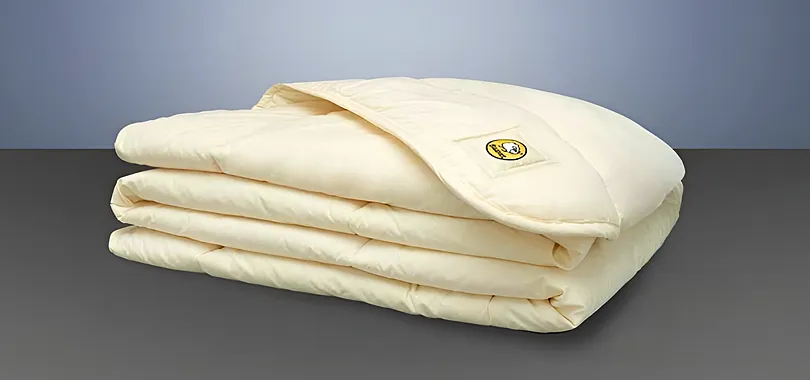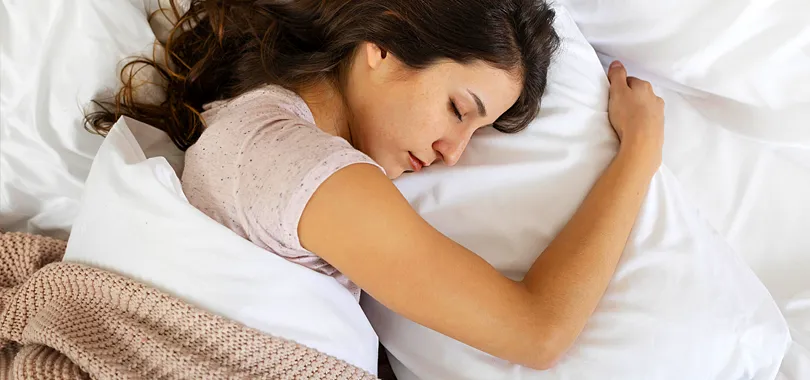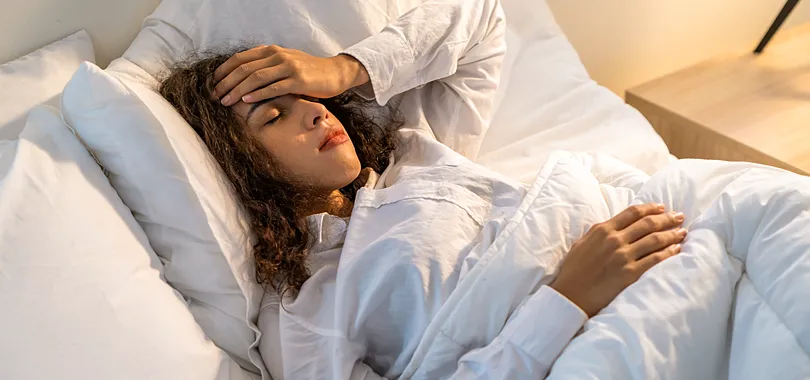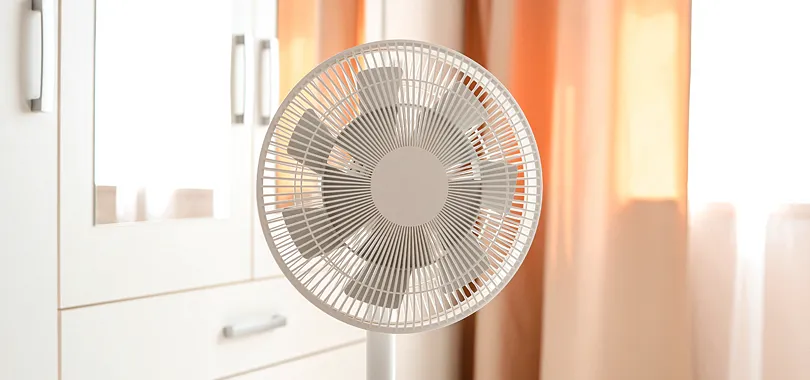
Why Do I Get So Hot When I Sleep?
Many people wake up in the night feeling overheated, restless, or even drenched in sweat. While it’s a common problem, the reasons behind it can vary widely, from something as simple as bedroom temperature to underlying health conditions. In this article, you’ll discover the most common causes of overheating at night and practical steps to create a cooler, more comfortable sleep environment.
Key Points
-
Room temperature and bedding are often the biggest culprits behind night-time overheating.
-
Hormones, health conditions, and medications can all disrupt the body’s natural temperature control.
-
Diet, alcohol, and late exercise can leave the body running hot long after bedtime.
-
Stress and sleep stages naturally raise body heat for some people.
-
Breathable bedding and natural fibres help regulate temperature and reduce overheating.

Is Your Room Too Warm?
A bedroom that’s too warm is one of the simplest causes of overheating. The ideal sleep temperature is usually around 16–18°C. If your room is warmer than this, it can interfere with your body’s natural cooling cycle and make it harder for you to stay asleep. Even small changes, like opening a window, using a fan, or adjusting the thermostat, can make a noticeable difference in comfort.

Bedding and Duvets
The type of bedding you use plays a big role in temperature regulation. Synthetic fibres tend to trap heat and moisture, leaving you sweaty or restless at night. Natural fibres like wool or cotton are more breathable and help wick away moisture, keeping your body temperature more stable. Choosing the right duvet or sheets can make a significant difference in how comfortable you feel while sleeping.

Sleepwear Matters
What you wear to bed can either trap heat or allow your skin to breathe. Thick or synthetic pyjamas tend to lock in warmth, while lightweight fabrics such as cotton or linen let air circulate and help your body cool naturally. Even small adjustments, like switching to short-sleeved pyjamas or lighter materials in warmer months, can reduce night-time overheating.

Hormones and Temperature
Hormonal changes play a major role in night-time overheating. Life stages such as menopause, pregnancy, or monthly cycles often bring temperature swings and sudden heat sensations. According to the NHS, hot flushes and night sweats are common symptoms during menopause. Men can also experience hormone-related night sweats, often linked to testosterone levels and other underlying factors, as explored in the causes of night sweats in men.

Health Conditions
Underlying conditions such as thyroid disorders, sleep apnea, diabetes, infections, or nerve damage (neuropathy) can all increase night-time heat and sweating. Persistent overheating or sweating could signal an underlying condition, so it’s worth consulting a healthcare professional.

Medications
Some medications can interfere with your body’s temperature regulation. Antidepressants, steroids, and certain diabetes treatments may list night sweats as a side effect. If you notice consistent overheating at night after starting a new medication, discussing it with your doctor can help determine whether your treatment might be contributing.

Diet and Alcohol
What you eat and drink before bed can affect your body temperature. Heavy or spicy meals increase metabolism and heat production, while alcohol can cause flushing and a feeling of warmth. Paying attention to meal timing and portion size can help prevent your body from running hot as you try to sleep.

Exercise Timing
Exercise increases core body temperature, and working out too close to bedtime can leave you feeling hot when you try to sleep. Even though exercise promotes overall sleep quality, it’s best to allow at least a few hours for your body to cool down before going to bed. This helps prevent residual heat from interfering with sleep.

Sleep Stages and Natural Cooling
Your body’s temperature naturally fluctuates during different stages of sleep. Starting a couple of hours before bedtime and continuing through the night, your core temperature gradually cools while your skin temperature rises. This process occurs as your blood vessels dilate, allowing heat to move toward the surface of the skin and be released into the environment. For some people, this natural shift can make them feel warm at night, even under light bedding.

Stress and Anxiety
Stress and anxiety can raise heart rate and stimulate the body’s stress response, both of which increase core temperature. While anxiety is a well-known cause of daytime sweating, its link to night sweats is less clear. A review in the National Library of Medicine notes that anxiety can disrupt sleep patterns and amplify your stress response at night, which may indirectly contribute to feeling hot while you sleep. Practising relaxation techniques before bed can help reduce this effect.

How to Stay Cooler at Night
Keep the Bedroom Cool
A cooler bedroom helps your body maintain a comfortable temperature while you sleep. Aim for around 16–18°C if possible. Simple adjustments, like opening a window, using a fan, or lowering the thermostat, can make a noticeable difference.
Choose Breathable Bedding
Switch to bedding that allows airflow and wicks moisture. Our wool duvets, for example, are paired with a 100% cotton cover that enhances breathability and comfort while working with wool’s natural thermal properties (and it’s not itchy, as some might wonder).
Why Wool Bedding Helps with Overheating
Struggling with becoming too hot at bedtime? Wool bedding offers a simple, natural solution.
Here’s why it works:

Regulates temperature – Keeps you cool when it’s hot, and warm when it’s cool

Absorbs moisture – Holds up to 30% of its weight without feeling damp

Releases humidity – Gradually expels moisture into the air to keep your bed dry

Naturally breathable – Promotes airflow and prevents overheating

Better sleep comfort – Reduces sweaty wake-ups and keeps skin feeling fresh
Choose the Right Wool Duvet Weight
Not all duvets are created equal, and the weight of your duvet makes a big difference to how well you sleep. Just like sheep in different climates grow different amounts of fleece, some people naturally run hotter while others feel the cold more. That’s why it’s important to choose the right duvet weight for your needs.
At Baavet, we offer four weight options — Super Light, Light, Medium, and Winter. For most sleepers, one of these will provide year-round comfort. While there’s no such thing as a one-size-fits-all “all season” wool duvet, many of our customers find that once they have the right weight, they can happily use it throughout the year.
If you’re unsure which option is best for you, our friendly customer service team is always on hand to help guide your choice.
Choose the Right Wool Duvet Weight
What you wear to bed can either trap heat or allow your skin to breathe. Thick or synthetic pyjamas tend to lock in warmth, while lightweight fabrics such as cotton or linen let air circulate and help your body cool naturally. Even small adjustments, like switching to short-sleeved pyjamas or lighter materials in warmer months, can reduce night-time overheating.
????And here’s another option: sometimes the best solution is to skip the sleepwear altogether. Sleeping closer to the wool in your Baavet duvet allows the natural fibres to regulate your body temperature more effectively. Wool can even balance two different temperatures in the same bed — perfect if you and your partner sleep differently.
Wear Lightweight Sleepwear
Opt for nightwear made from breathable materials like cotton or linen. Lightweight sleepwear lets your skin breathe, prevents overheating, and works together with your bedding to keep your body temperature balanced.
The Warm Bath Effect
Taking a warm bath about 90 minutes before bed can help you fall asleep faster. This process, known as the “warm bath effect,” temporarily raises your body temperature. When you step out of the bath, your core temperature naturally drops, which mimics the body’s natural night-time cooling process and signals that it’s time to sleep. This simple ritual can make it easier to feel comfortable and relaxed as you settle into bed.
Time Your Meals and Exercise Wisely
Eating heavy, spicy meals or drinking alcohol too close to bedtime can increase your body temperature. Similarly, exercising late in the evening can leave your body running hot. Giving yourself enough time to cool down before bed can help prevent overheating.
Manage Stress
Stress and tension can raise your core temperature and make it harder to sleep. Simple relaxation techniques such as deep breathing, stretching, or reading can help calm your body and reduce night-time heat.

Sleep More Comfortably, Naturally
Feeling too hot at night can have many causes, from lifestyle and sleep habits to health and hormonal changes. If overheating is frequent or affecting your well-being, it’s always a good idea to speak with a healthcare professional. In the meantime, small adjustments to your sleep environment can help you feel cooler and more comfortable.
At Baavet, we specialise in natural wool bedding designed to support restful sleep:
-
Breathable and moisture-wicking, to help you stay dry through the night
-
Temperature-regulating, so you stay comfortable without overheating
-
Naturally hypoallergenic, gentle on sensitive skin
While bedding alone may not completely solve night-time overheating, choosing the right materials can make your nights feel less disrupted, more comfortable, and easier to manage.
Explore our wool bedding collection and take steps toward cooler, more restful sleep.

